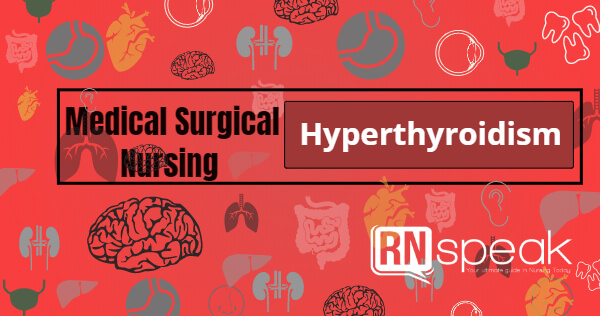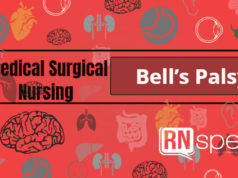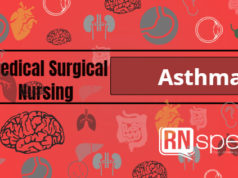Hyperthyroidism is a metabolic imbalance that causes overproduction of thyroid hormones. The thyroid gland is this little butterfly-shaped organ behind the larynx that produces thyroid hormones; thyroxine (T4) and triiodothyronine (T3), responsible for certain metabolic processes such as energy metabolism, temperature regulation, and other sympathetic activities in the human body. It is the second most prevalent endocrine disorder, after diabetes mellitus, affecting more women than men.
Graves’ disease is the most common form of hyperthyroidism caused by abnormal stimulation of the thyroid gland by circulating immunoglobulins.
Thyrotoxicosis; also known as thyroid storm, is caused by hyperthyroidism but has a more excessive concentration of thyroid hormones due to overstimulation of the thyroid gland. This is caused by stress that occurs more often after subtotal thyroidectomy. This is a life-threatening situation that requires an urgent medical response.
Causes
- Autoimmune disease (Grave’s disease)
- Genetics
- Neoplasms in the thyroid gland
- Increased thyroid-stimulating hormone (TSH) secretion –negative feedback mechanism
Clinical Manifestations
–Tremors
-Intolerance to heat
-Irritable
-Diaphoretic
-Tachycardia (palpitations)
-Hypertension
-Increase gastrointestinal peristalsis (diarrhea)
-Weight loss
-Muscle wasting
-Enlarged thyroid (goiter)
-Bulging eyes (exopthalmos)
-Amenorrhea
-Breast enlargement
-Soft skin
-Fine soft hair
-Finger clubbing
-Pliable nails (very hard nails)
Assessment of the thyroid gland
Inspection and palpation- Instruct the patient to extend the neck slightly and swallow.
-thyroid tissue should rise normally with swallowing.
-palpate to note size, shape, symmetry, & tenderness.
Diagnostic Finding
- Elevated thyroxine (T4) level- > 58.5 to 150 nmol/L
- Elevated triiodothyronine (T3) level- > 1.15 to 3.10 nmol/L
- High Radioactive Iodine Uptake (RAIU) through thyroid scanning.
- Elevated thyroid-stimulating hormone (TSH or thyrotropin) level using serum immunoassay
- Elevated free thyroxine (FT4) level through serum immunoassay.
- Negative(benign) or positive(malignant) result after aspiration biopsy
Medical Management
- Propylthiouracil (PTU) – block synthesis of thyroid hormones to decrease output of T3 & T4. Methimazole Their life-threatening adverse effect is Agranulocytosis.
- Sodium Iodide- lyse thyroid gland cells to bring thyroid gland’s activity down.
- Saturated solution of potassium iodide (SSKI)– reserved for severe thyrotoxicosis by blocking the synthesis of thyroid hormones to decrease output of T3 & T4.
- Propanolol- a beta-adrenergic blocker to relieve signs and symptoms of hyperthyroidism e.g. hypertension, tremors, tachycardia, irritability, & other hypersympathetic activities.
- Thyroidectomy– surgical removal of the thyroid gland. Subtotal thyroidectomy is usually done to patients with hyperthyroidism wherein 5/6 of the total thyroid tissue is removed. Patients need to be evaluated for hypothyroidism, which can develop years after surgery.
Hyperthyroidism Nursing Management
- Provide a cool environment.
- Minimize stress by providing privacy and placing the patient in a private room.
- Teach patient to avoid stimulants such as coffee, sweets, tea, soft drinks, energy bar and cigarette smoking.
- Watch out for signs of Agranulocytosis (decrease in WBC) such as sudden onset of fever and sore throat when patient has medications such as PTU or Methimazole.
- Monitor for other unusualities such as allergic reactions to drugs, and others.
- Patient care post-thyroidectomy
Assessment
√ Assess airway – obstruction due to inflammation
√ Assess vital signs- helps detect bleeding or hemorrhage
√ Assess bleeding- look at patient’s dressing at the back of the neck.
√ Observe if patient always swallows- sign of bleeding
√ Monitor for signs of Hypocalcelmia
√ Monitor voice quality
Complications
√ Airway Obstruction
√ Laryngeal Nerve Damage- Normal to have a hoarse voice within the first 3 days to weeks.
– No improvement of the voice for 6 weeks to 12 months is considered to have permanent damage.
(Hermann et al2004).
√ Hemorrhage
√ Hypocalcemia- < 4.5 – 5 mEq/L or 8.5-10.5 mg/dL
– Signs & symptoms: tetany, paresthesia, bronchospasm,
(+) Trosseau’s sign,(+) Chvostek’s sign, prolonged Q-T interval on cardiac monitor.
At bedside : prepare
√ Tracheostomy set
√ Oxygen
√ Suctioning machine
√ Calcium gluconate
– Eye care for patients with exopthalmos
- eye shades- for patients with photosensitivity
- eye drops- helps keep eyeballs moist
- cover with clean gauze- usually at bedtime to promote sleep
- raise head of bed- to relieve eye swelling
- Question and clarify medication orders for aspirin. Make sure aspirin is avoided as this can increase free thyroid hormones in the system.
- Diet should be high in calories and high in protein.
References
- http://www.differencebetween.net
- http://nursingstandard.rcnpublishing.co.uk Brunner& Suddarth’s Medical-Surgical Nursing 10 ed. Vol. 2 by Suzanne C. Smeltzer & Brenda G. Bare Pathophysiology an Incredibly Easy! Pocket Guide by Lippincott Williams & Wilkins








